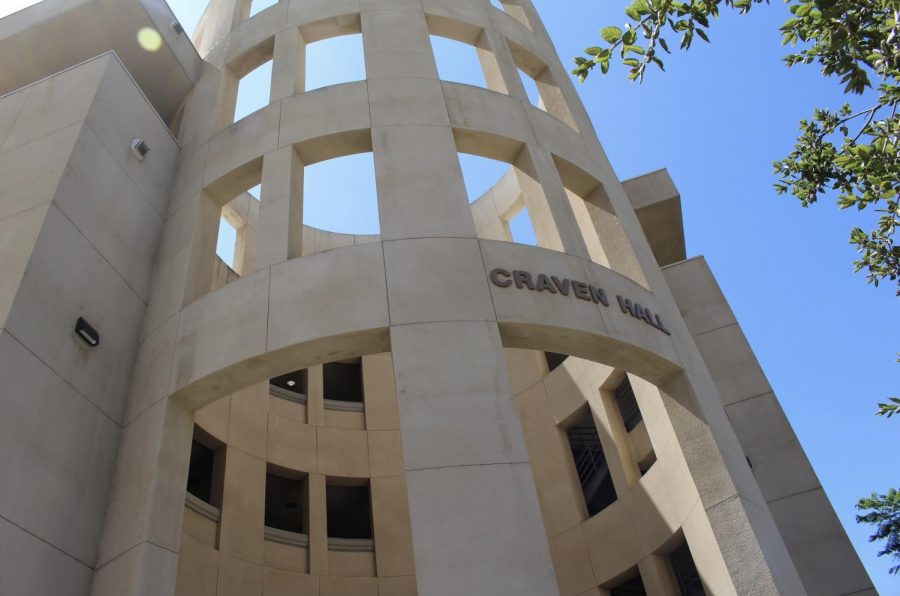Task force to evaluate legacy of late Senator Craven
The Craven Task force was created following the events of the Academic Senate vote in April.
November 8, 2021
CSUSM President Ellen Neufeldt recently charged a task force to examine the legacy of the late state legislator William Craven, following the Academic Senate resolution last spring endorsing the removal of his name on CSUSM buildings and streets.
The call for the removal of the late senator’s name came after his past comments on undocumented immigrants and the Hispanic community. The Academic Senate vote in April passed with 56 for, two against and two abstaining.
The Craven task force’s mission to examine the late senator’s legacy will “analyze and build a common understanding of the contemporary issues surrounding the William A. Craven name,” according to the Office of the President’s website.
The Craven task force, consisting of faculty, student and community representatives, had its first meeting in the beginning of October and will submit a final report to President Neufeldt by Feb. 1.
Dr. Patricia Prado-Olmos, CSUSM’s chief community engagement officer and interim dean for the College of Humanities, Arts, Behavioral and Social Sciences (CHABSS), Dr. Elizabeth Matthews are co-chairs of the task force
“We need to make sure that we hear lots and lots of voices about this issue,” said Dr. Prado-Olmos, who is responsible for ensuring that the process is as transparent and inclusive as possible.
The pandemic has made it challenging. “Some people are good with meeting in person; others feel safer meeting virtually,” said Prado-Olmos.
The 22 members of the task force were either appointed or voluntarily joined based on their interest in the issue, said Prado-Olmos. For student representatives, the committee worked with ASI to select students. . The task force also consists of community members.
She said President Neufeldt wanted a careful study to situate the late senator’s legacy and activity related to CSUSM, related to the incident surrounding the naming that called into question the naming of Craven Hall and looking at the current context.
“It’s about looking at the relationship, outlining the consequences of either changing the name or keeping the name,” said Dr. Prado-Olmos of the task force’s job.
The original naming was approved by the CSU Board of Trustees in 1989 before any building was built for the university. Dr. Prado-Olmos also mentions numerous letters written to the then-president of CSUSM Bill Stacy and the Board of Trustees advocating for the building to be named after the senator.
President Neufeldt would decide whether to go forward with renaming Craven Hall, but it would need to go to the Board of Trustees, said the co-chair.
The current call to rename Craven Hall is not the first time CSUSM’s Academic Senate has supported the removal of Craven’s name. In 1994, the student newspaper, formerly known as The Pride, reported that the Academic Senate voted unanimously to support the removal of Craven’s name from the CSUSM building, but no further action was taken.
As the chief community engagement officer for the university, Dr. Prado-Olmos says that there have been community members who have voiced their reactions to the Craven taskforce and the Academic Senate endorsement of removing Craven’s name from CSUSM.
“I’ve had a number of community members express interest, concern, and deep regret that we’re not just leaving things alone. We have launched a website as soon as we could, and we’ve received numerous emails, numerous feedback that believes that it’s important to keep the name and outlined numerous reasons for it,” said Prado-Olmos.
In terms of response from the late senator’s family, Prado-Olmos says that they have also expressed concern about the renaming.
Apart from the feedback website, the task force plans to hold public forums in the future. Dr. Prado-Olmos said she had hoped to have a range of forums this semester, but COVID-19 is making it challenging.
“I’m hoping we’ll maybe have at least one for students and then continuing various formats in the spring,” said Prado-Olmos, “I’m hoping we’ll have a larger on-campus presence in the spring, so we can host larger conversations.”
The Craven taskforce co-chair shared that while the deadline for the extensive report on Craven’s legacy is in February, they will most likely ask President Neufeldt for an extension. She also said that Neufeldt wants a preliminary in-progress report in December.
Dr. Prado-Olmos says that it is hard to predict if the removal of Craven’s name from the university will happen.
“My role is to ensure the process gets to something where CSUSM can move forward with integrity that this has been well-studied. It depends on how well the committee understands and sees the materials that we have.”
“Listening to voices is going to be critical in the process,” said Dr. Prado-Olmos.
For more information on the Craven task force, please visit https://www.csusm.edu/president/initiatives/craven/index.html.



Val Mid • Apr 17, 2023 at 11:05 am
CSUSM/Cal State San Marcos is in an awkward position of dishonoring a WW2 veteran/military veteran.
They also removed his statue bust as well. If this is the case of RACISM; why not ban and remove Planned Parenthood ads, remove books about Margaret Sanger, remove religious Muslim and Christian clubs, and remove books and posters about Charles Darwin because they all have history of recorded racism, homophobia, and transphobia.
Also perhaps remove Chinese language classes because China is under fire for oppressing minorities rights.
So much for diversity!